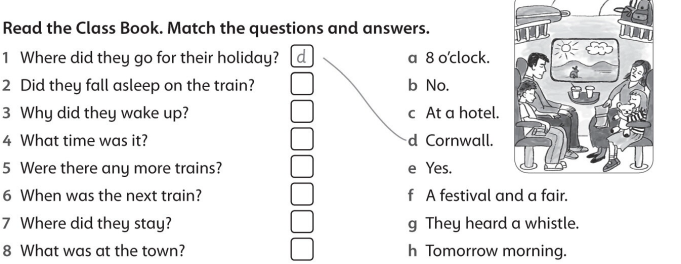Урок розвитку навичок читання за темою "Holidays" у 4 класі
План уроку розвтку навичок читання у 4 класі на тему "Holidays" за підручником Naomi Simmons (2014)Family and Friends 4 2nd edition Class book. До уроку додаються всі матеріали.Цей урок можна провести не прив'язуючись до підручника.
Lesson plan
Information about the class
|
There are 8 pupils in this class, three boys and five girls. They are 9 years old. Three students are strong and feel confident in reading and speaking. Two students have come this year; they are weak and need a lot of support and correction. One learner is very shy. All pupils like working in pairs and groups very much. |
Lesson aim(s)
|
To develop children’s gist reading and reading for details. To develop pupils’ speaking on the topic Holiday. To activate children’s vocabulary on the topic Holiday. |
Rationale
|
I’ve chosen this text, because it is in the children’s coursebook and it can help me develop pupils’ reading skills. After reading the story children will be able to talk on the topic Holiday and it will develop their speaking skills. |
Language analysis
|
Form |
Meaning |
Pronunciation |
|
disappointed
fair
whistle
follow
join
Past Simple |
unhappy because something did not happen
a public event, usually held outside, where goods are shown and sold and where there is often food and entertainment to make a long, high sound while moving quickly through or past something
to move behind someone or something and go where he or she goes
|
/ˌdɪs.əˈpɔɪn.tɪd/
/feər/
/ˈwɪs.əl/
/ˈfɒl.əʊ/
/dʒɔɪn/
|
Materials
|
Naomi Simmons (2014)Family and Friends 4 2nd edition Class book, p.66; flashcards, the adopted tasks(the True/False task, the dialogue),emojis, jumbled letters.
|
Assumptions
|
Strong children like reading and they do this with pleasure,so they might understand the story and do the tasks without mistakes. But for weak pupils it is a challenge, so they might do mistakes in the task and they might have problems with understanding the story. These children travel a lot on their holidays, so they might like this text and they might talk on this topic with pleasure. The learners have learnt Past Simple, so they might understand the text in the Past and talk about their last holiday. |
|
Anticipated difficulties |
Solutions |
|
Weaker students might misunderstand the instructions from the first time. |
Use ICQs after instructions. |
|
Strong pupils can be very quick. They can finish the tasks first . |
Give them the additional task(Appendix 5). |
|
Two weak pupils will not work together effectively |
Organise them into different pairs. |
|
Pupils might want to use Ukrainian. |
Encourage pupils to speak English. |
|
Weaker students might have problems with ideas about their last holiday. |
Give them the dialogue with prompts (Appendix 6) |
|
Children can forget to use Past Simple during their talking on the topic Last holiday |
Remember children about this grammar before the dialogues. |
Board Plan
|
|
|
Stage |
Stage aim |
Procedure |
Interaction |
Time |
|
Warm-up |
To get learners’ attention and to get them interested in the topic
|
Greet pupils. Say pupils to guess what I have in my magic bag. They have to guess that they are letters. Divide children into two groups, give children the jumbled letters (Appendix 1) and ask them to make the word (Holiday)which will be the topic of our lesson. Check children’s understanding by ICQs. Children will make the word. The fastest group will be the winner. Put the name of the topic on the board. Show children what we are going to do during the lesson on the board. Ask pupils if they like holiday, when they usually have holiday, where they usually travel, how they usually travel and what their favourite kind of travelling is and why. |
Whole class Group work |
5 min |
|
Pre-reading task |
To activate pupils’ vocabulary on the topic Holiday To get learners interested in the topic |
Ask pupils to think about holiday and write all words that they associate with it .Check children’s understanding by ICQs .Divide them into groups. Monitor children’s work. Count words and decide what team is the winner. Say pupils that these words will help them to understand the story and to talk on the topic Holiday. Say children to look at the pictures on the board, that they are from the boy’s story (Appendix 2), Ask them to describe what they see. Ask pupils to predict what will happen in the story in pairs. Check children’s understanding by ICQs. Divide into pairs. Monitor pupils’ work. Ask for their ideas. |
Group work Whole class Pair work |
5 min |
|
Pre-teach vocabulary |
To help learners understand the text |
Say children they will meet new words that in the boy’s story (Appendix 3) and that we need them to understand the text. Show flashcards on the board and elicit new words. Check children’s understanding of them by CCQs and drill. |
Whole class |
5 min |
|
Gist reading task |
To help learners get a general idea of the text |
Ask learners to read the story and after reading say if the boy liked his journey and choose the best title for the story(Appendix 4). Say that they have to read the text quickly, that there will be the opportunity to read it again for more detailed information. Check children’s understanding by ICQs. Children will read. Ask pupils to compare the answers with their partner. Check pupil’s answers as a whole class. |
Individually Pair work Whole class |
3 min |
|
Detailed reading task |
To help learners to understand most of the text |
Say pupils that they will read the text again and do the task after reading .Say that they will have to write if the statements are true or false (Appendix 5). Check learners’ understanding by ICQs .Children will work. Give the additional task for fast finishers (Appendix 5). Ask children to compare their answers in pairs. Check these tasks as a whole class. Ask students if they liked the story, how many stars they will give for it, if they recommend it to their friends. |
Individually Pair work Whole class |
15 min |
|
Post-reading task |
To develop learners’ speaking skills |
Say pupils that they will talk about their last holiday in pairs, that they will ask questions from the handouts and that they have to listen to the partner and decide if they want to have the same holiday or not. Pay attention that they have to use Past Simple in their answers. Divide pupils into pairs. Give pupils dialogues (Appendix 6) Weaker pupils will have prompts for this task (Appendix 6). Ask one pupil to ask me the questions from the dialogue. Check children’s understanding by ICQs. Monitor pupils for collecting good language and mistakes. Reorganise pupils into pairs and ask them to talk without dialogues , that they have to ask as many pupils as they can and find the most interesting holiday. Check children’s understanding with ICQs. Monitor pupils for collecting good language and mistakes. Ask pupils whose holiday is the most interesting in their opinion. |
Pair work Whole class |
12 min |
|
Feedback |
To analyse pupils’ language |
Thank learners for good work. Collect feedback on content (was the text difficult for you? Did you understand the story? Could you talk on the topic Holiday).Connect language that was used during the lesson with children’s life(Can you talk on this topic with people from other countries?). Use the board to show some examples of good language that was used. Write some sentences with mistakes on the board and ask students to correct them. Ask pupils to think about their work , if they worked very well, if they understood the text, if they did mistakes in the tasks, if they could talk on the topic Holiday, if they used Past Simple .Ask them to assess themselves putting a magnet on the right emoji on the board. Praise my students for good work. |
Whole class |
5 min |
Appendix 1
Holiday
Appendix 2
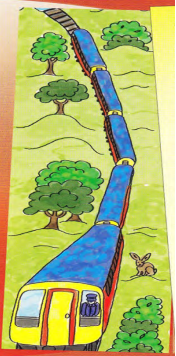

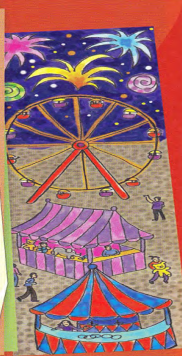
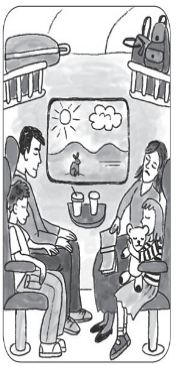
Appendix 3





|
follow |
fair |
|
disappointed |
whistle |
|
|
join |
Appendix 4
Choose the best title
|
A bad journey |
|
A good journey |
|
An unusual journey |
Appendix 5
|
Handout 1 Write T(true) or F(false)
|
The additional task for fast finishers
|
Handout 2
|
Appendix 6
Dialogue(for stronger learners)
|
Talk about your last holiday
-When was your last holiday? - -Where did you go? - -How did you travel there? - -What did you do during your holiday? - -What was the weather like? - |
Dialogue(for weaker learners)
|
Talk about your last holiday -When did you have your last holiday? -………………………………………………(Last summer/spring/this winter/two years ago) -Where did you go? -……………………………………………………..(to the seaside, to the mountains, to Spain, to Turkey, to Egypt, to my grandma, to the country house, to the village) -How did you travel there? -……………………………………………………….(by car/by plane/by bus/by ship) -What did you do there? - ………………………………………………………….(swam, walked, bought souvenirs, went shopping, played with friends, read, danced, went to the cinema ). -What was the weather like? -…………………………………………………………(It was hot/sunny/cloudy/rainy/windy).
|
Appendix 7
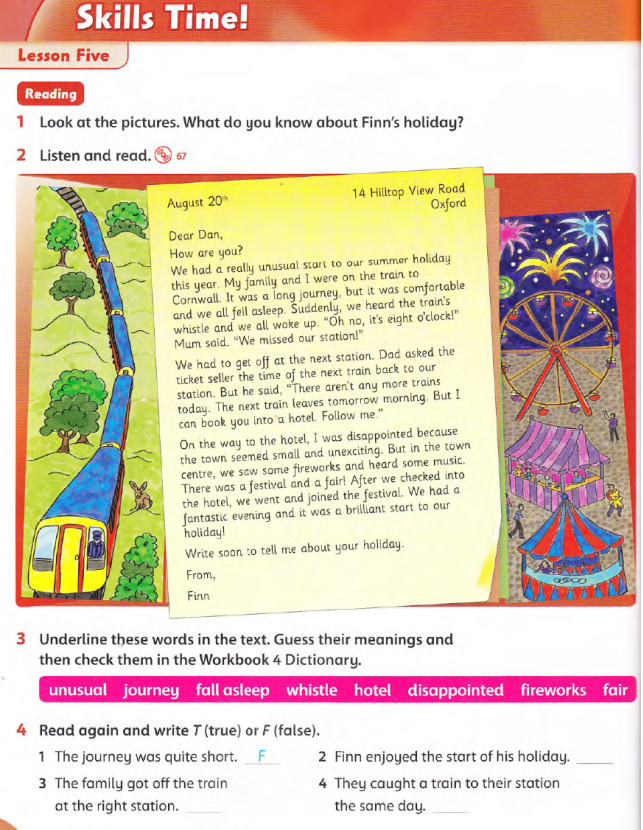


про публікацію авторської розробки
Додати розробку


